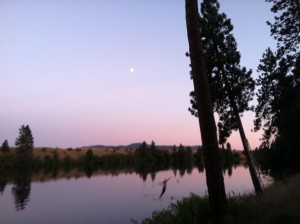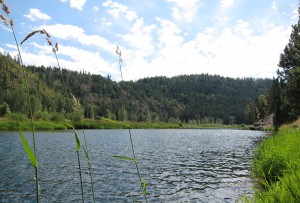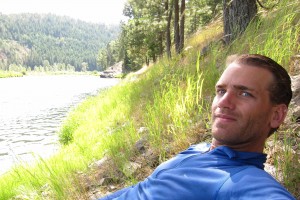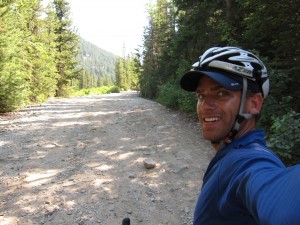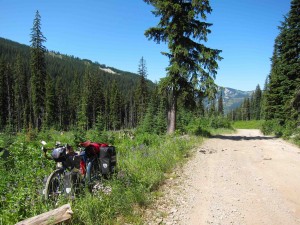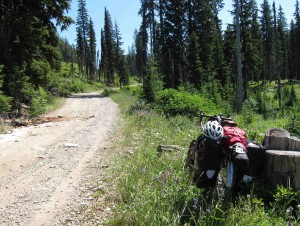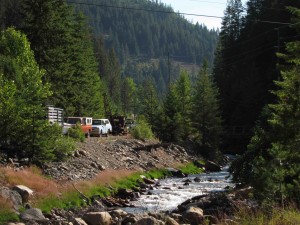12 Aug, 2011
 While waiting for the day to warm enough to justify a swim in the Little Spokane River the other day, I read through the latter portion of Whitman’s “Song of Myself.” Amidst the strikingly confident language, what stood out to me was a sense of inspired humility. The same voice that declares “I laugh at what you call dissolution,/And I know the amplitude of time” (22) acquiesces “I bequeath myself to the dirt to grow from the grass I love,/If you want me again look for me under your boot-soles”(52). (For more “Song of Myself,” see http://www.princeton.edu/~batke/logr/log_026.html or treat yourself to a copy of Leaves of Grass.)
While waiting for the day to warm enough to justify a swim in the Little Spokane River the other day, I read through the latter portion of Whitman’s “Song of Myself.” Amidst the strikingly confident language, what stood out to me was a sense of inspired humility. The same voice that declares “I laugh at what you call dissolution,/And I know the amplitude of time” (22) acquiesces “I bequeath myself to the dirt to grow from the grass I love,/If you want me again look for me under your boot-soles”(52). (For more “Song of Myself,” see http://www.princeton.edu/~batke/logr/log_026.html or treat yourself to a copy of Leaves of Grass.)
 Whitman’s unconquerable yet fragile spirit gave me a new sense of humility. Humility does not mean being less than you are. A truly humble person is complete and fully engaged—not limited or falsely modest. Like Job after the whirlwind, the humble person knows his/her/their relationship to all things. (Key also to Terrence Malick’s recent film The Tree of Life, which draws from the same well.) But without living into the fullness of one’s being in that Self beyond the individual self or ego, humility is deception. It implies presenting something that one is not. Honest humility combines Whitman’s unconquerable spirit with a respect for all others and an awareness of one’s limitations.
Whitman’s unconquerable yet fragile spirit gave me a new sense of humility. Humility does not mean being less than you are. A truly humble person is complete and fully engaged—not limited or falsely modest. Like Job after the whirlwind, the humble person knows his/her/their relationship to all things. (Key also to Terrence Malick’s recent film The Tree of Life, which draws from the same well.) But without living into the fullness of one’s being in that Self beyond the individual self or ego, humility is deception. It implies presenting something that one is not. Honest humility combines Whitman’s unconquerable spirit with a respect for all others and an awareness of one’s limitations.
 It is worth noting that it often requires outside circumstances to bring about this humility. We call it “being humbled.” It’s that magically awful experience of coming out of pride into relationship with all things. The joy of this experience is being back in tune with the world outside of the ego. The pain is the awkwardness of having lived outside of that awareness.
It is worth noting that it often requires outside circumstances to bring about this humility. We call it “being humbled.” It’s that magically awful experience of coming out of pride into relationship with all things. The joy of this experience is being back in tune with the world outside of the ego. The pain is the awkwardness of having lived outside of that awareness.
Sometimes, humility does not require quite the same notion of mistaken thoughts. Rather, it has to do with facing something greater than the individual. Consider the athlete who has given her all in training and competition but has somehow come up short. Or call to mind the well-intentioned new parent who has read every book available to prepare for his child’s birth but turns to jelly at the sight of the precious, fragile life incarnate in the newborn. Beyond the individual, there lies mystery, and that mystery changes our orientation to greater awareness of all beyond ourselves.
Whitman’s humility takes this a step beyond incidents that keep pride in check. The poet’s voice seems to not require events to maintain mindfulness. Or better yet, perhaps the poet has those reminders or events everywhere. Maybe this is the spirit behind Whitman’s:
“I see something of God each hour of the twenty-four, and each moment then,
In the faces of men and women I see God, and in my own face in the glass,
I find letters from God dropped in the street, and every one is signed by God’s name,
And I leave them where they are, for I know that wheresoever I go
Others will punctually come for ever and ever.” (Song of Myself, 48)

Isn't walking on water a sign of the divine? This selfless pursuit of a stick has an enthusiasm that is in line with true humility. Lots of fun, too!

Familial love-- a sign of the divine and the goofy. Hopefully, we recognize the former more often than the latter.
Amidst these signposts to the divine, I was humbled in two distinct incidences this week. The first was very simple. While cycling along a tranquil path near the banks of the Coeur d’Alene River in Northern Idaho, I was inspired by a stretch of water and the dry summer sun to pull over and take a dip. (Yes– I’ve been swimming a lot of late.) As I did so, the cold mountain river quickly did away with any sweat on my body and reminded me that these hills were covered in snow only a few weeks ago. While I sat drying in the sun by my bike, a butterfly landed on my leg. I could hardly feel it, but I could sense its life in the slow, graceful shifting of its wings and antennae. The butterfly did not make me any less than I am. It merely reminded me of something delicate and eternal in both of us.
The second incidence of humility brings us back to our athletic example. Since I left Seattle, I have been a bit suspicious of my new tires. They seem a bit big to me—more like mountain bike tires than road tires. Fortunately, I learned the value of having these big tires when I crossed from Wallace, Idaho to Thompson Falls, MT. I had inquired as to the condition of the road in the local bike shop before heading for the hills, and I was assured that it was paved the whole way. It was not. I ended up mountain biking with panniers over a high mountain pass. The descent, which nearly wore out my brakes, was perhaps worse than the climb. Both sides were very rocky and required my full attention. It was easily my most technical ride with the panniers to date. The demand on my body and attention was humbling. But that humility was not the sort that made me less than I am; rather, it required all that I had and reminded me to respect the unknown.
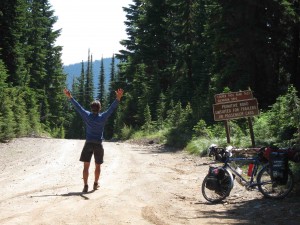
Crossing into Montana from Idaho at Cooper Pass. No signs. Just a change in topography to mark the passage.
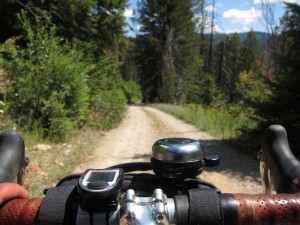
Thaddeus makes his first touring mountain bike descent. Hard to see the incline, but the whole stretch was definitely steep.
Speaking of the unknown becoming known, I’d like to consider one of the greatest acts of humility in the Christian tradition. Folks talk about Christ’s “humility” in becoming human. Provided that we maintain a Christology that is fairly Chalcedonian, this humility did not entail becoming less divine. Rather, the Logos was fully realized and divine, and the human Jesus was fully human. Becoming human is not something beneath the divine. Rather, the intimacy of divine/human relations is one that preserves the autonomy of each. That is, the humility of Christ implies the affirmation of creation—not its rejection, as is often popularly depicted.
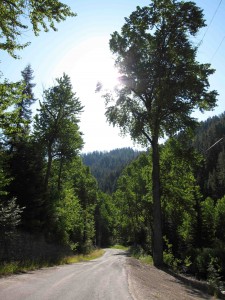 Our relationship to the planet requires this same bold humility evident in Whitman and Christ. To sustain our place on the planet, we must be aware of how we relate to others. We must recognize the fragility of biodiversity. We must respect our own need for clean air, clean water, and a climate that does not vary drastically from that in which the human species has developed. To do so, we must live into the fullness of our being: our creativity, our ingenuity, and our abilities as both individuals and a collective. That requires knowledge. It requires strength. And it requires sensitivity. Most importantly, it requires humility.
Our relationship to the planet requires this same bold humility evident in Whitman and Christ. To sustain our place on the planet, we must be aware of how we relate to others. We must recognize the fragility of biodiversity. We must respect our own need for clean air, clean water, and a climate that does not vary drastically from that in which the human species has developed. To do so, we must live into the fullness of our being: our creativity, our ingenuity, and our abilities as both individuals and a collective. That requires knowledge. It requires strength. And it requires sensitivity. Most importantly, it requires humility.
Until we meet again
More creatively humble
Than we thought possible.



